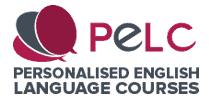How to memorise English vocabulary effectively and recall it in future conversations
How can you memorise English vocabulary effectively and recall it in future conversations?
Browsing the Internet, you may come across dozens of techniques to remember English vocabulary. Check out these fifteen fairly basic methods.
I can’t deny that reading, using a dictionary, singing songs, drawing pictures and keeping a notebook of words are beneficial techniques when it comes to memorising English vocabulary.
BUT, there is a difference between memorising English vocabulary for the sake of just memorising it, and memorising English vocabulary so that you can easily recall it and use it when you are in the middle of a conversation.
Read on to find out how you can memorise English vocabulary effectively so that it'll be on the tip of your tongue and “swimming” in your brain in your future conversations.
MEMORISE ENGLISH VOCABULARY EFFECTIVELY - ACQUAINTING YOURSELF WITH NEW WORDS YOU THINK WILL BE USEFUL WHEN COMMUNICATING IN ENGLISH
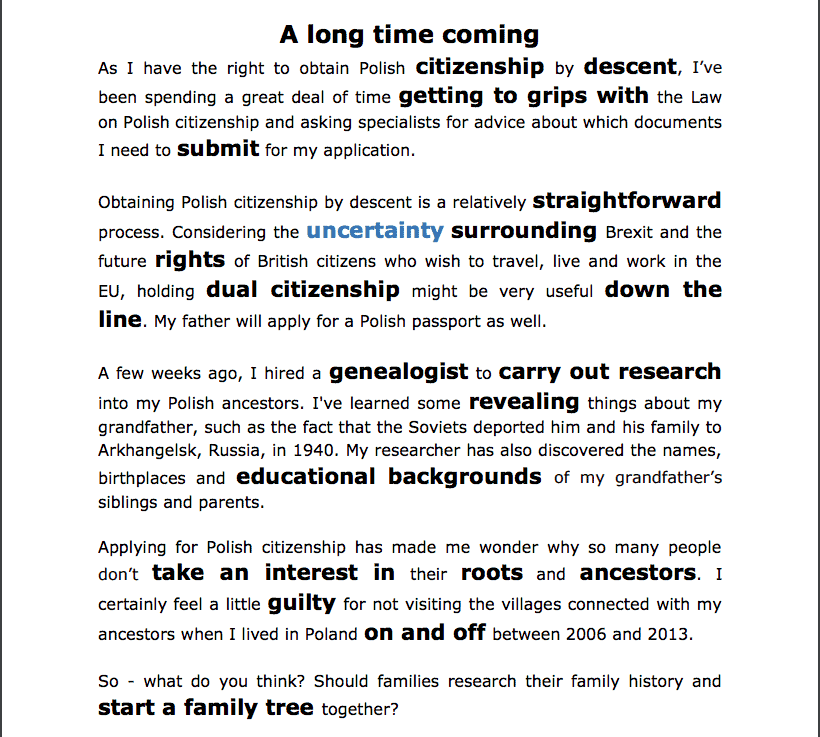
A teacher's self-written English language text
The text above summarise my experience applying for Polish citizenship. Following the steps below will help you get the most out of the text in order to memorise English vocabulary effectively. The icing on the cake would be for this vocabulary to become part of your everyday speech. Let’s focus on the word “citizenship”:
1. Listen to the text and read it quickly to get a sense of what it’s about. Links to the audio files can be found here, here and here.
2. If you don’t know the meaning of “citizenship”, look up its definition in a good English dictionary. Alternatively, you can translate it into your first language
3. Use one of the audio files to say the word “citizenship” aloud in order to become familiar with the pronunciation
PUT IN EFFORT TO GET TO KNOW A WORD AND ITS NATURAL COLLOCATES DEEPLY
It’s simply not enough to see a word, check its definition and listen to the way it’s pronounced a few times.
Apart from the effective memorisation of each target word, your aims should be to:
(a) find out how each target word functions in a range of contexts
(b) find out which other words each target word collocates with
(c) create personalised sentences containing the target word
With the above goals in mind, let’s dive in to check the next set of stages to learn the word “citizenship” in the deepest possible manner:
4. I have written extensively about the idea of creating and maintaining a Word-Phrase Table here and here.
However, to get to know our target word, “citizenship”, inside out, let’s remind ourselves of the concept of a Word-Phrase Table:
(a) Split a google doc into columns. If you feel that it’s necessary, write your mother tongue equivalent on the left-hand side. Add the target second language word on the right hand side:
(b) Using a good Collocations Dictionary, study the most natural and useful collocations which collocate with the target word. I thoroughly recommend you grab a copy of the Oxford Collocations Dictionary for students of English.
The entry for the word “citizenship” reveals just how beneficial this dictionary is for students of English:
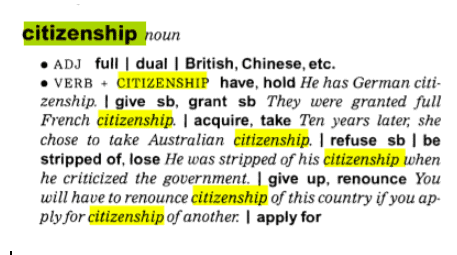
Entry for "citizenship" from the Oxford Collocations Dictionary
(c) Using information from the Oxford Collocations Dictionary, or any other appropriate sources, transfer some of the collocations to your Word-Phrase Table after a dash (-), thus:

(d) In order to memorise English vocabulary and collocations effectively, create TRUE and PERSONALISED sentences containing the target word and associated collocations. You can also add personal opinions which contain the target word.
With spaced repetition, these sentences will soon be on the tip of your tongue in future conversations.
To attain high-quality audio input, a native speaker could create audio files of your sentences.
In the table below, I have created some sentences which are TRUE for me after a star (*):
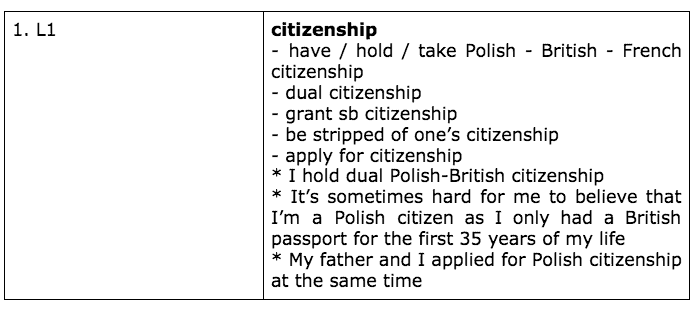
(e) See the table below. I strongly believe in the power of visualisation. You can use different colours, fonts and italics to enhance my visual memory. The colours of the Polish flag are red and white. Therefore, making the phrases “Polish citizen” and “Polish citizenship” stand out in a bold red colour helps to create a strong association between Poland and the target phrases “Polish citizen” and “Polish citizenship”:
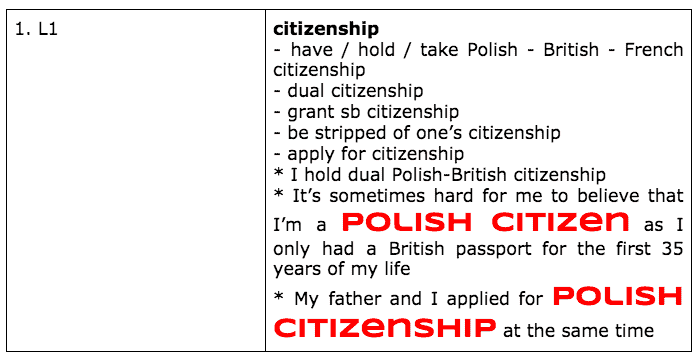
5. If you would like to add even more personalised sentences to your Word-Phrase Table, or just get to know a word more deeply, here are two ways to do that:
(a) Check out the website Word Hippo.
First of all, type “citizenship” into the "Sentences" box and click “find it”:
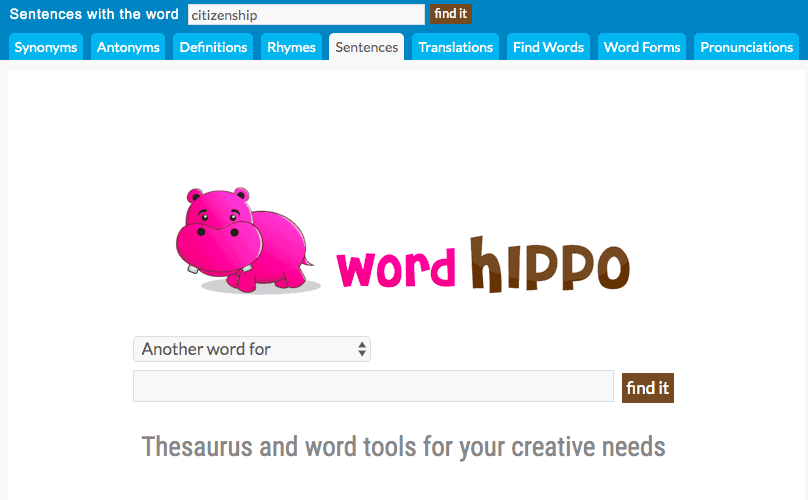
A list of sentences containing the word “citizenship” then appears. These sentences appear in mostly trustworthy sources on the Internet, such as Government websites and well-known newspapers.
Scroll through the sentences. They may provide you with ideas so that you can create your own similar personalised sentences or opinions which you can add to your Word-Phrase Table. You might only need to make small changes to the sentences which Word Hippo provides to make them personal to you.
(b) Use corpora to gain further contextual information about words you have added to your Word-Phrase Table.
So, what is a corpus?
A corpus is a collection of linguistic data, either compiled as real written texts or as a transcription of real examples of recorded speech.
The information that corpora contains is typically presented in the form of word frequency lists and concordances. Concordances display keywords in context in example sentences.
On english-corpora.org, there are plenty of corpuses available, such as The Movie Corpus, The TV Corpus, the Corpus of Contemporary American English (COCA) and the British National Corpus (BNC).
The British National Corpus (BNC) was originally created by Oxford University Press back in the 1980s - early 1990s. It contains 100 million words from a plethora of genres (e.g. spoken, fiction, magazines, newspapers, and academic).
CONCLUsion
In order to memorise English vocabulary effectively, I believe that you can apply the methodology outlined above to any English language text or transcript you come across in the future.
Remember - your goal should always be to develop deep and long-lasting associations with English words by keeping a record of:
- A target word’s most common collocations
- Personalised sentences - true sentences about you and your life which contain a target word
The key to fluency is having words, collocations and personalised sentences on the tip of your tongue during conversation.
By updating your Word-Phrase Table, using Word Hippo and exploring corpuses, you will be able to memorise English vocabulary effectively and indefinitely.
